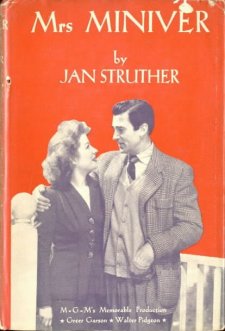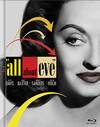





Mrs. Miniver (1942)
Cast | Crew | Awards | Articles | Dialogue | Bibliography | Downloads | Links | Image Credits
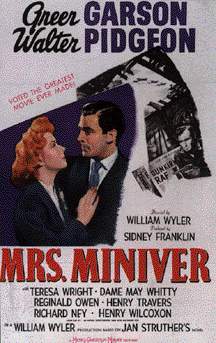 This story of an average English middle-class family begins with the summer of 1939; when the sun shone down on a happy, careless people, who worked and played, reared their children and tended their gardens in that happy, easy-going England that was so soon to be fighting desperately for her way of life and for life itself. --Prologue to MRS. MINIVER There is no lack of supporting evidence that MRS. MINIVER is a fantastic film. It was nominated for twelve Academy Awards in 1942 and took home six: Best Actress (Greer Garson), Best Supporting Actress (Teresa Wright) and Best Director (William Wyler), as well as Best Black-and-White Cinematography, Best Writing, and Best Picture of the year. |
|
But more than its appeal to the Academy of Motion Picture Arts and Sciences or even its popular appeal at the time -- it was the top-grossing film of 1942 and the second biggest box-office hit of the decade, following GONE WITH THE WIND (*1) --, were MRS. MINIVER's effects on the isolationist temperaments of its 1940s American audience. There was not a single battle scene in this war film, yet through its portrayal of the hardships suffered and overcome by a middle-class English family during the Blitz, Americans came to sympathize with the English, and support for American involvement in the European war rose dramatically. Director William Wyler even acknowledged this as a primary motive for the film when he commented, "I was a warmonger. I was concerned about Americans being isolationists. MRS. MINIVER was obviously a propaganda film."(*2) |
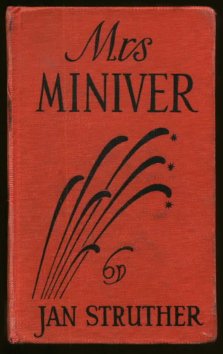 Yet if the public realized they were being subtly manipulated, they seemed not to mind, as in scene after scene they laughed, grew somber, and even cried. Hollywood produced hundreds-upon-hundreds of propaganda films before and after the United States joined World War II, but the immediacy and humanity with which MRS. MINIVER personalized its message though characters the audience came to care about, as well as the overall quality of its production, set it apart from other films of the period. More than just a propaganda piece, MRS. MINIVER succeeded as a movie, making its message all the more potent. Even British Prime Minister Winston Churchill commented that MRS. MINIVER was "more powerful to the war effort than the combined work of six military divisions."(*3) True or not, it remains one of the most important and socially significant films in American history. |
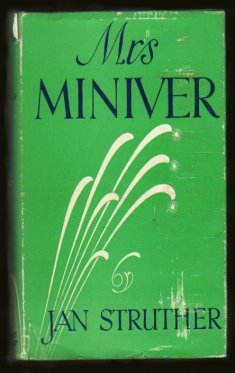 Based on characters introduced by author Jan Struther in Mrs. Miniver, a quaintly meandering collection of tales centered around a middle-class English family, the 1942 film departs significantly from what little plot is set forth in the book, but with good reason. Struther's book was published in 1939 and made no reference to the impending war. As a result of this, and because MGM intended from the outset to make MRS. MINIVER a pro-British war film, the screenwriters (with the help of director William Wyler) extrapolated Struther's book, expanding on her story by carrying her characters forward into a new and challenging setting. The result is a film and a book which bear little resemblance to each other but each of which stands solidly on its own. As a literary adaptation, the film's greatest success is the way in which it captures the distinctly human qualities of its characters (especially those of Mrs. Miniver) as originally depicted in Struther's book. MRS. MINIVER opens by introducing the film's title character, an architect's wife who splurges on a new hat while on her weekly shopping trip to London. Played by Greer Garson, an accomplished 33-year-old British actress and one of MGM's rising stars, Mrs. Miniver is immediately established as a likeable character (although one might question her taste in hats). |
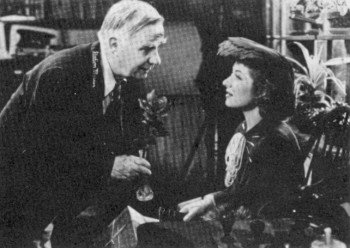 Upon her guiltily tardy return to her hometown of Belham on the outskirts of London, she passes a friendly word with Mr. Ballard the station master (played by Henry Travers, with Garson at left). Much to her surprise however, Mr. Ballard has more than the usual pleasantries in mind. In fact, in grateful appreciation of Mrs. Miniver's ever-present friendliness towards him, he shows her a rose he has cultivated and asks her permission to name it after her. Flattered, Mrs. Miniver accepts.If one were to break the film down into its "propaganda" components, one of the first would have to be the effort on the part of its filmmakers to put their American audience at ease with the highly class-conscious British social structure which no film about Britain in the 1940s could hope to ignore. In an effort to dispel concerns Americans might have about joining the European war to aide such an "undemocratic" society, MRS. MINIVER tackles the issue of social class head-on by differentiating between the various classes of characters (through occupation, dress and manner of speech) while at the same time demonstrating the compassion and sympathy of purpose that exists between them despite their differences. |
|
Footnotes: |
| Now in Print! |
|---|
| Now on DVD! |
|---|
Buy Videos & DVDs |
|
Buy Movie Posters |
|
Buy Movie Posters |
|
Classic
Movie Merchandise |
|
![]() Printer-friendly version.
Printer-friendly version.
![]() Return
to the top.
Return
to the top.
Last updated:
March 10, 2011.
Reel Classics is a registered trademark of Reel Classics, L.L.C.
© 1997-2011 Reel Classics, L.L.C. All rights reserved. No
copyright is claimed on non-original or licensed material.
Terms of
Use.




